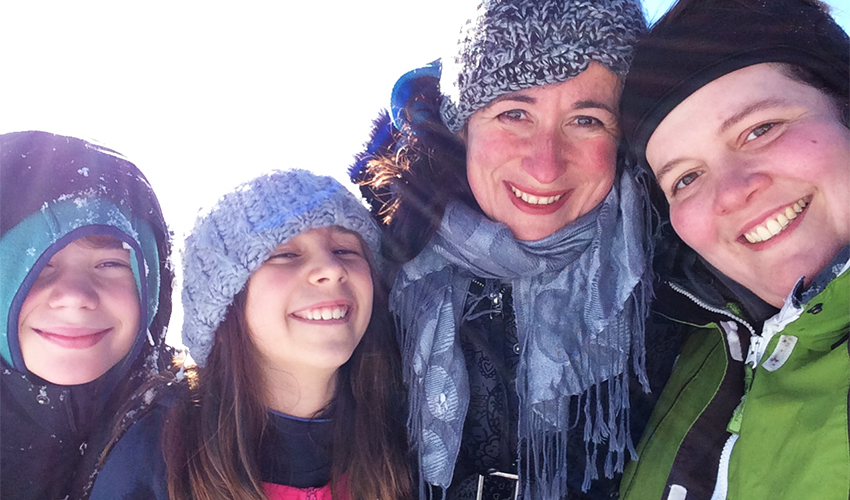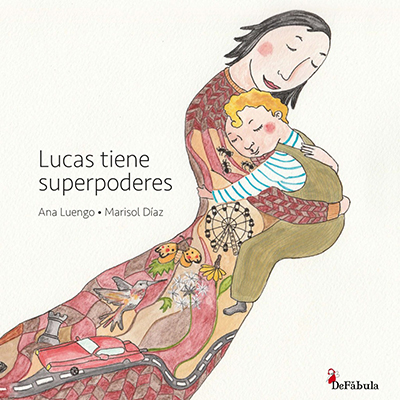New children's autism book among first written in Spanish

The new children's book "Lucas tiene superpoderes" is going into its second printing in Spanish. The book is based on Assistant Professor Ana Luengo's son Niklas, far left, at the age of 4. Pictured next to Niklas is his sister Milena, Ana Luengo and Lani Phillips, Luengo's partner.
Ana Luengo, assistant professor of modern languages and literature, has unquestionable academic credentials. She speaks five languages and is a seasoned editor and author, with one scholarly book now in its second printing and another awaiting publication. This semester, she teaches a 19th century Spanish literature and culture class and a graduate-level course that examines poetry and political commitment.
And although her most recent publication may not be considered scholarly — it's a children's book — it carries important messages that she hopes will help children and adults alike gain a greater understanding of the facts and the misconceptions surrounding autism. It's also deeply personal.
"Lucas tiene superpoderes" (Ediciones DeFǎbula S.C.P), released in Spain, was inspired by Luengo's 11-year-old son Niklas, who is autistic, and her 9-year-old daughter Milena, who is not. Translated, the title means "Lucas has superpowers." The book targets readers ages 6 to 10, and Luengo believes it is the first of its kind about autism written in Spanish for that age group.
The story is told through the eyes of 8-year-old Pablo, the oldest of six cousins who gather at their grandmother's home for her 70th birthday celebration. It's the first time the whole family has gathered since Pablo's cousin Lucas, now 4, was an infant. As they observe his behavior, the cousins try to understand why Lucas behaves the way he does. Lucas's mother explains that Lucas is autistic and that some situations are difficult for children with autism.

"Lucas tiene superpoderes" is the first book of its kind about autism written in Spanish for 6-to- 10-year olds.
The release of the book, illustrated by Marisol Díaz, coincides with International Autism Awareness Month, observed every April. Autism spectrum disorder (ASD) and autism are both general terms for a group of complex disorders of brain development characterized, in varying degrees, by repetitive behaviors and difficulties in social interaction and verbal and nonverbal communication, according to the organization Autism Speaks. ASD affects more than 3 million individuals in the U.S. and tens of millions worldwide.
Luengo was inspired to write the book when her daughter Milena, who was in kindergarten at the time, began asking questions about Niklas, much like the characters in the book do, and there were no books available in Spanish to explain the disorder to children. "Lucas tiene superpoderes" includes a question-and-answer section meant to stimulate open discussion between children and adults about the disorder. "It's about having a conversation afterward, not just reading the book and going to sleep," according to Luengo.
"The spectrum of autism is so broad, it's huge," she said. "You have people who aren't able to talk, who aren't able to make decisions, who are unable to read or write. Then on the other hand, you have people who are scientists, who are writing novels, who can speak 10 languages. [Autism is] very difficult to explain. And in between a lot of people with their skills and difficulties, like everyone"
Niklas was diagnosed at age 3 and non-verbal until he was 4 1/2. When he was 6, he told Luengo that the other kids at school told a joke he didn't understand. "He knew he was different and he asked me why, so I explained to him that he had autism and what that meant," she said. "But at the same time, it was confusing to him because he's highly skilled in math and art, so he wondered why some things were so easy for him."
Niklas has undergone speech therapy and sensory integration therapy. Today he speaks and writes in English and German, and understands Spanish, earns A's and B's at school and enjoys drawing, writing novels, playing soccer and chess, and superheroes — not necessarily in that order.
Luengo said she hopes "Lucas tiene superpoderes " will raise awareness of the growing number of children with autism and the "importance of teaching kids to accept each other from the beginning."
"It's very, very important not to reinforce stereotypes about autism. People with autism are persons," said Luengo. "Every child with autism has different potential, and they each have the right to reach their potential."